Phasing out highly hazardous pesticides in vegetable farming (Ethiopia)
PAN UK and PAN Ethiopia have been working since 2018 to support smallholder vegetable farmers in Ethiopia’s Central Rift Valley to replace Highly Hazardous Pesticides (HHPs) with safer methods of managing pests and diseases, improving net incomes and reducing human and environmental harms.
Farming in a biodiversity hotspot
Lake Ziway is the largest freshwater lake in Ethiopia’s Central Rift Valley. It is a biodiversity hotspot with over 400 recorded species of migratory bird, home to a sizeable population of hippos and an important source of fish for local consumption. The lake and its surroundings help support the livelihoods of around 2 million people, mainly smallholder farmers growing cereal crops, beans and vegetables. In fact, the area is one of the country’s major vegetable production zones, with the important consumer market of the capital, Addis Ababa, only 3 hours’ drive away.
Unfortunately, human and wildlife populations here are facing a variety of environmental pressures. High levels of water abstraction from the lake for irrigation and domestic consumption, watercourse pollution by pesticides, fertilisers and sewage, and deforestation and soil degradation in the surrounding hills are seriously damaging ecosystems and the natural resources on which farming ultimately depends. Smallholder vegetable farmers are finding it difficult to make a living, especially when they are heavily dependent on expensive agrochemicals.
What’s the problem?
Vegetable farmers in the Lake Ziway area have long been encouraged to use large quantities of highly hazardous pesticides (HHPs). These chemicals are damaging their health, the health of local communities and the natural resources on which they depend.
18 of the 28 pesticides in use by smallholder farmers are on PAN International’s HHP List, with hazards related to acute human toxicity, chronic human health and environmental harm. Some of the most commonly used are the neurotoxic insecticide profenofos, the insecticide, lambda-cyhalothrin, which can be fatal if inhaled, and the fungicide mancozeb, recently banned in Europe due to its potential to damage fertility, harm the unborn child and cause cancer.
They rely on frequent applications of these pesticides. Surveys reported that pesticides are used 12-22 times in smallholder onion production, while large-scale tomato growers spray tomatoes at least 20 times in one season. PAN Ethiopia found that 65% of farmers experienced mild to moderate poisoning and 72% of farm workers recalled symptoms consistent with acute pesticide poisoning.
There is also serious concern for livestock, bees, fish and other wildlife in and around this important wetland ecosystem.
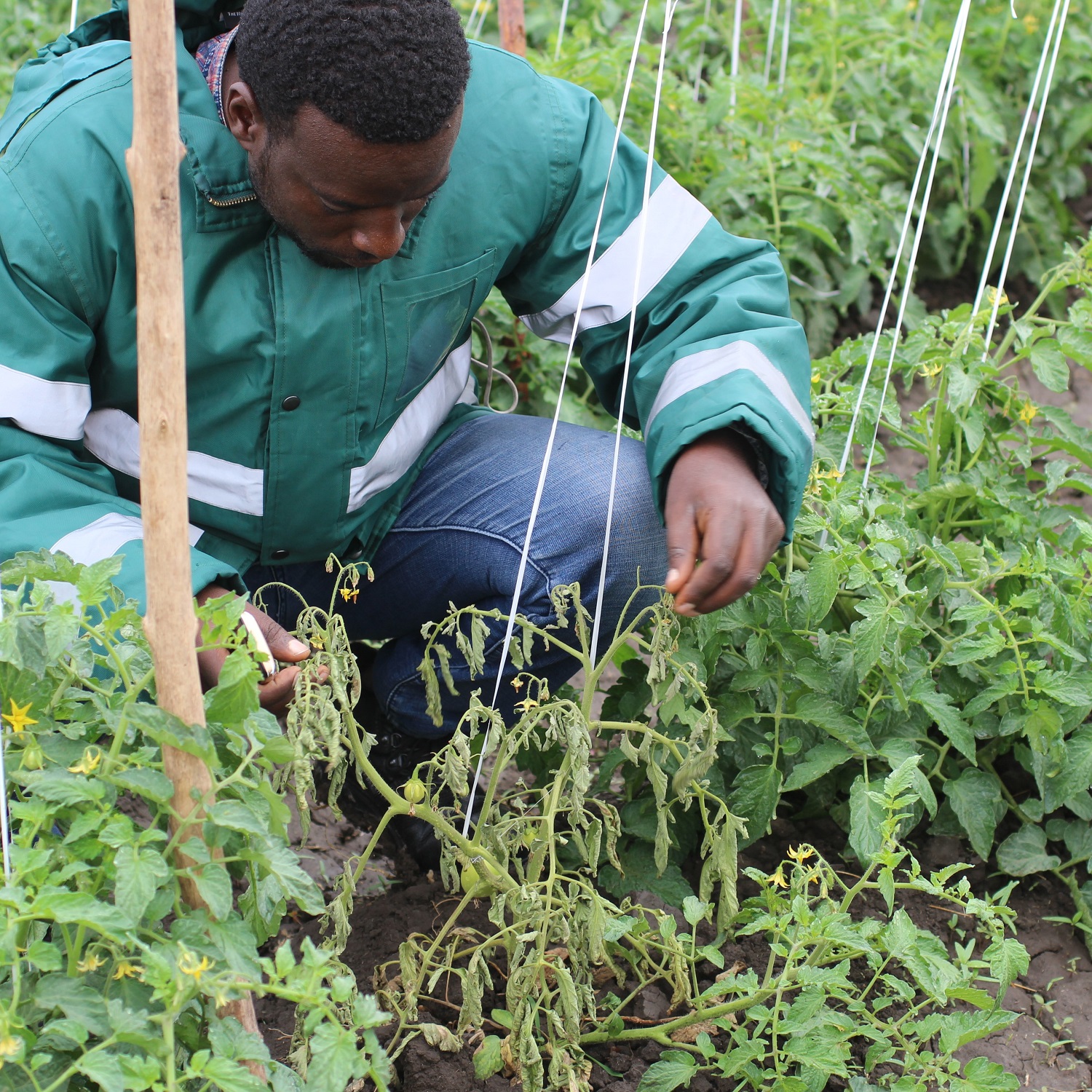
What have we achieved by working together?
Over a three-year period, the team has been able to demonstrate the benefits of adopting Integrated Pest Management (IPM) methods into vegetable farming.

Reduction in HHPs
We reduced the use of Highly Hazardous Pesticides (HHPs) by 50-85% resulting in reduced risk to farmers and their families of poisoning and better protection of the environment.

Reduced costs
Pest and disease management costs were cut by 73% in growing tomatoes and 60% in growing onions.
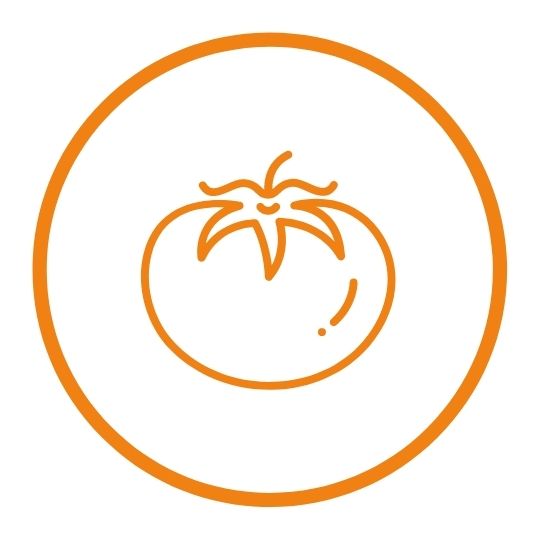
Increased yields
Farmers either had similar or increased yields while reducing pesticide use.

Improved crop quality
Farmers found that the new farming methods increased the quality of their crops.
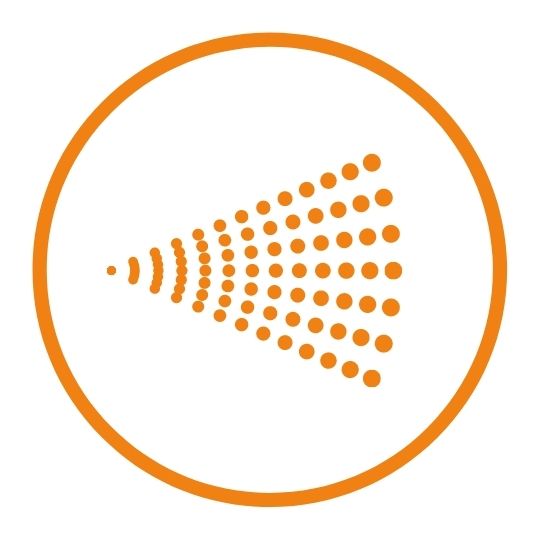
Fewer pesticide applications
The number of pesticide applications per season were reduced by 60-100%
How did we achieve these results?
PAN Ethiopia trained 600 farmers in five villages in the region. Participants learned new farming methods, including ways of reducing their reliance on pesticides, at our successful Farmer Field Schools set up specifically for the project. A high proportion (33%) of the recruited farmers were female, many of whom play an important role in vegetable production tasks and decision-making but rarely get invited to the government’s agricultural training. Farmers were very receptive and keen to learn and immediately began to change their practices.
One the main objectives of the project was to trial our ‘food spray‘ method of controlling pests in the vegetable crops. Already used very successfully in our local cotton projects, the food spray reduces the need for insecticides by attracting in ‘pest-eating’ predatory insects. Using local materials, including waste brewer’s yeast, the food spray is easy and affordable to make.
Strips of the flowering legume alfalfa (lucerne) were sown at the trial field borders to provide a safe habitat (refuge) for these natural enemies. Alfalfa also works well to attract pollinators, adds nitrogen into the soil and can be cut as fodder for farm animals. Neem seed extract was sprayed on the crop when extra pest control was needed. Hazardous insecticide use was minimised to protect natural enemies and take maximum advantage of their work as natural pest controllers.
Our trials showed that the food sprays and alfalfa strips worked well to bring more natural enemies, particularly ladybirds, hoverflies and lacewings, into the crop and helped keep key pests from reaching damaging levels. By combining the food spray method with IPM principles of good crop hygiene, regular field observation and careful crop husbandry, the PAN Ethiopia team were able to limit insecticide use to just one or two sprays per season and eliminate the most harmful HHPs.
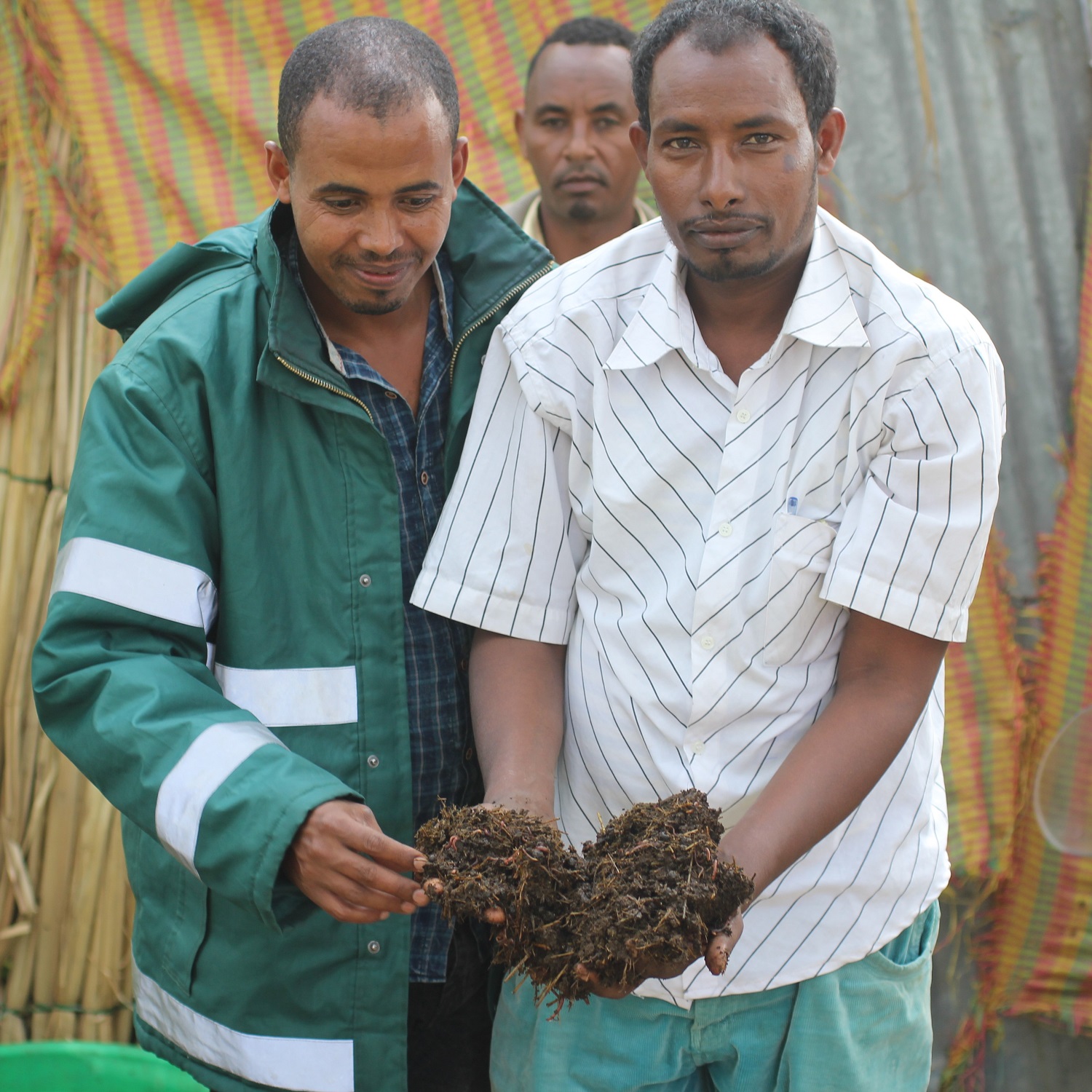
A win for improving health and environment
PAN Ethiopia have been able to show that it is perfectly feasible to grow vegetables profitably without using the most toxic insecticides.
Only 5.5% of farmers surveyed at the end of project recalled an acute poisoning incident in the last year (incurred when spraying pesticides on their conventional plots), compared with 20% of farmers at the project start. The new practices learned enabled farmers to greatly reduce the risk of poisoning to themselves and other farm workers and incidents may even be completely eliminated if their whole farm is managed under IPM.
We haven’t yet assessed to what extent replacing chemicals with IPM methods benefits the environment, although the team has recorded significantly more beneficial insects in trial plots.
The team is also helping farmers to produce compost on-farm. This will help to address poor soil health in several villages, increasing populations of beneficial soil organisms, conserving soil moisture and reducing the amount of water needed for irrigation. Sowing alfalfa strips, leaving more natural vegetation around fields and installing perches for insect-feeding birds should also ‘make more space for nature’.
PAN Ethiopia plans to introduce more agroecological practices for soil and plant health and to raise farmer awareness of the value of biodiversity.
Some feedback from those involved
Meet some of the farmers, field agents and PAN-Ethiopia staff involved.
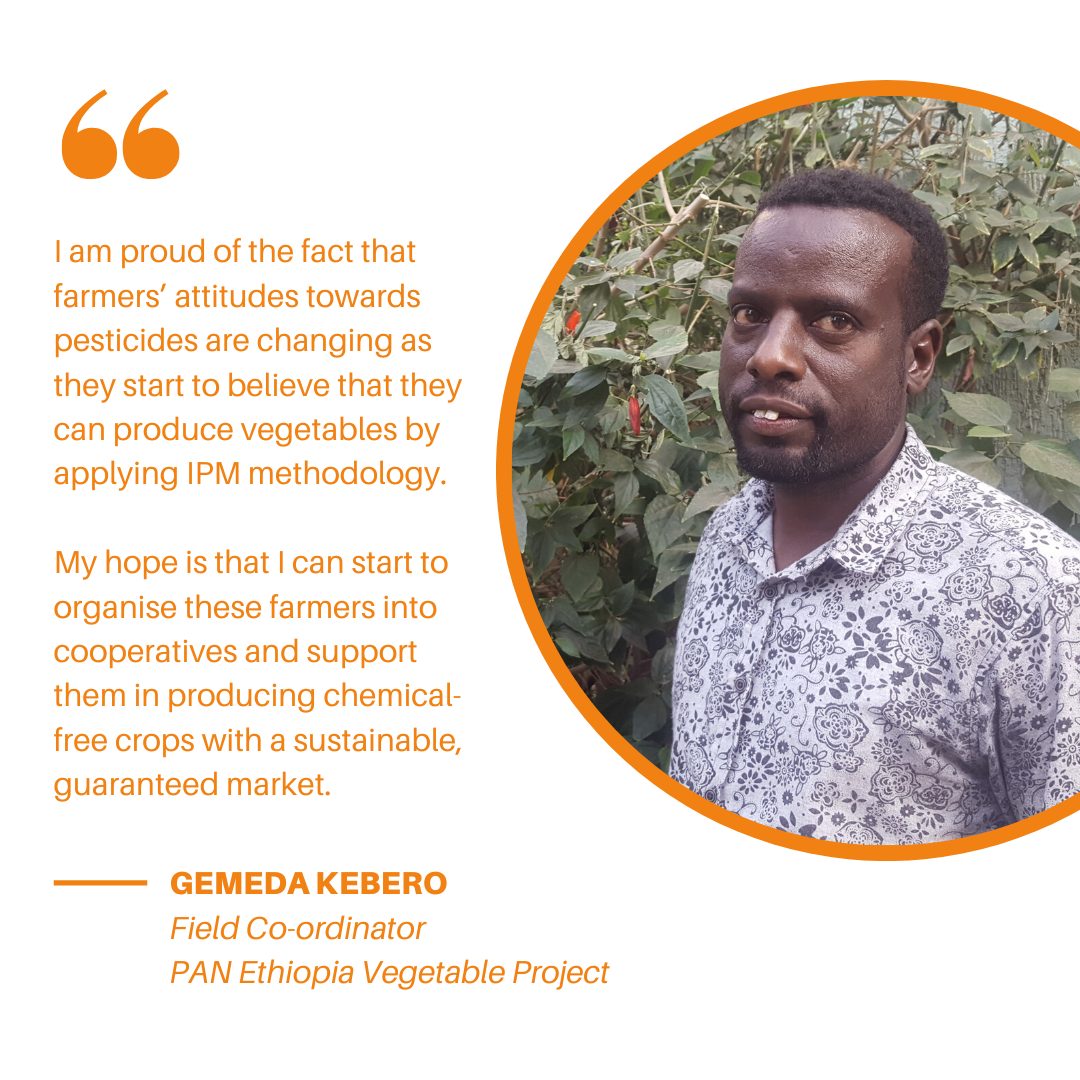
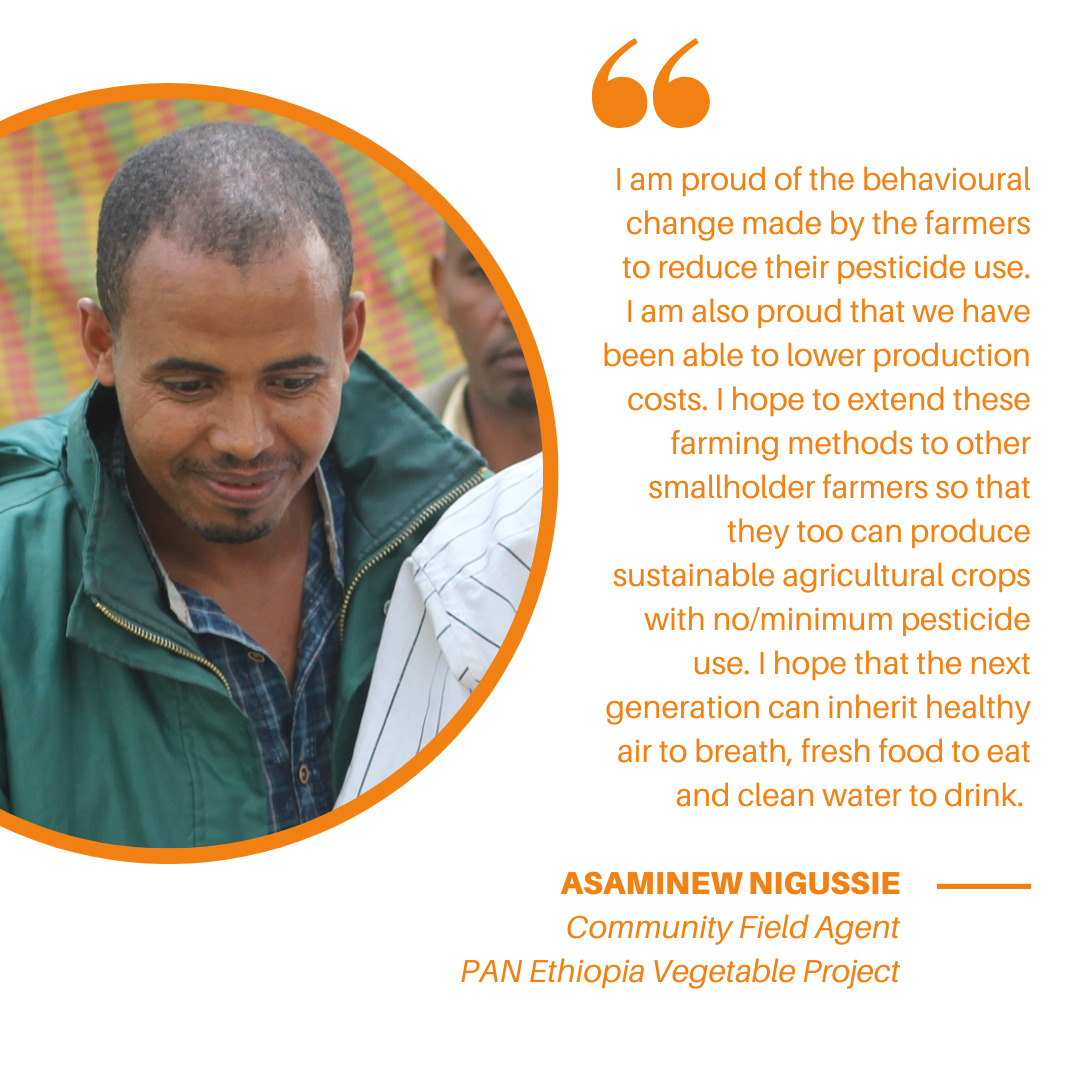
Tahir Gamme, Farmer
“I am a lucky farmer to get this opportunity of learning as most farmers lost most of their money on chemicals.”
Tahir is one of the original members of the Edo Gojola Farmer Field School group. He explains that before he got involved, he used chemicals as his first option for pest management as he did not know any other ways to control pests. Neither was he aware of the impact of hazardous pesticides on humans, the environment and beneficial insects such as bees. He did not really know when to spray, the appropriate doses to use, the importance of using Personal Protective Equipment or how to identify which insects were pests. In the training he learnt skills in field observation and assessment, agroecosystem analysis, pest identification, insect behaviour and life cycles, and decision making on pest management.
Shewangizaw Yosef, Farmer
“It is a new journey to meet my dream!”
Shewangizaw grows cereal and vegetable crops to feed his family and provide household income. He joined PAN Ethiopia’s Farmer Field School training in 2019. He previously spent a lot of money on agrochemicals. “I got you at the critical time of my life!” he recounts, when explaining how the experience has benefited his family’s livelihood. He had almost decided to give up on growing vegetables when he volunteered part of his field as a demo plot to compare the project IPM practices with his usual, chemical-intensive ones. He was overjoyed to report that the IPM methods yielded healthier, higher quality onion bulbs with lower production costs. In 2020, Shewangizaw was selected to attend a farmers’ market for health-conscious customers in Addis Ababa. He was able to sell 300kg of his onions at a fair price direct to consumers, sidestepping the middlemen who dominate the Ziway local trade on unfavourable terms for smallholders.
Simon Agu, Farmer
“I gained skills on how to prune the infected tomato plant to minimize the chance of diseases spreading to the whole plant.”
Simon started vegetable production in 2012 after he complete his diploma in education, growing tomatoes, onions, cabbages, peppers and green beans. He has expanded to medium-scale production on 4-6ha of his own and rented land. Synthetic fertilizers and pesticides have been the mainstay for his crop nutrition and pest management, however, pests were developing resistance and soil fertility continued to decline. Simon joined the Farmer Field School training in 2019, despite being sceptical, but by the end of the 3 month training he was convinced of the new methods and hosted a demo plot. Simon was able to cut his use of insecticides from 16 rounds to three and fungicides from three rounds to zero, reducing overall pesticide use by 72%. Even though the IPM tomato plot yielded 13% less than his usual practices, the cost savings on pesticides delivered a net income of 57,700 Ethiopian birr per quarter hectare, while his conventional tomato barely broke even at 510 birr. Simon is now a committed IPM convert and plans to plant neem tree saplings to provide an on-farm source of pest-repelling botanical extract.
Funding for trialling the food spray method in vegetables in Ziway, Ethiopia, was kindly provided by IDH (the Sustainable Trade Initiative, from the Netherlands) and The JJ Charitable Trust (in the UK).
We also thank the Ziway Board of Agriculture and Ziway Plant Health Clinic for their invaluable collaboration.
